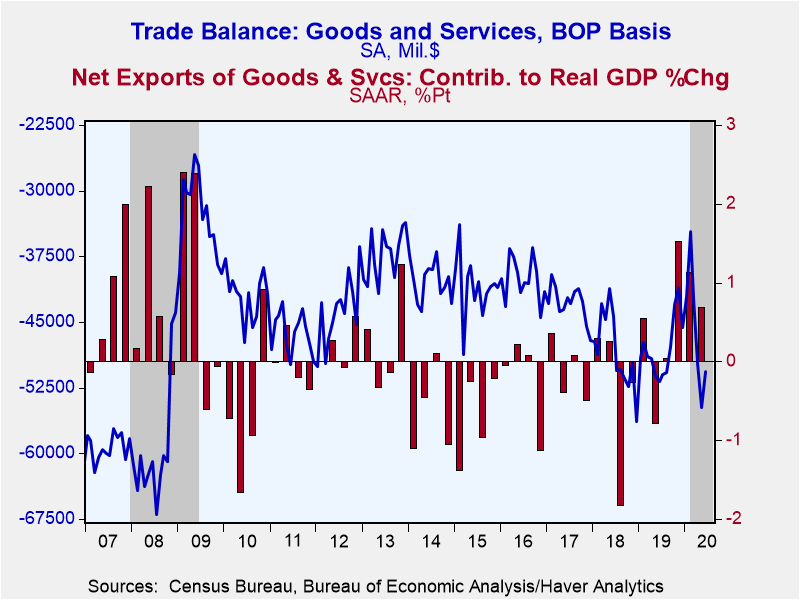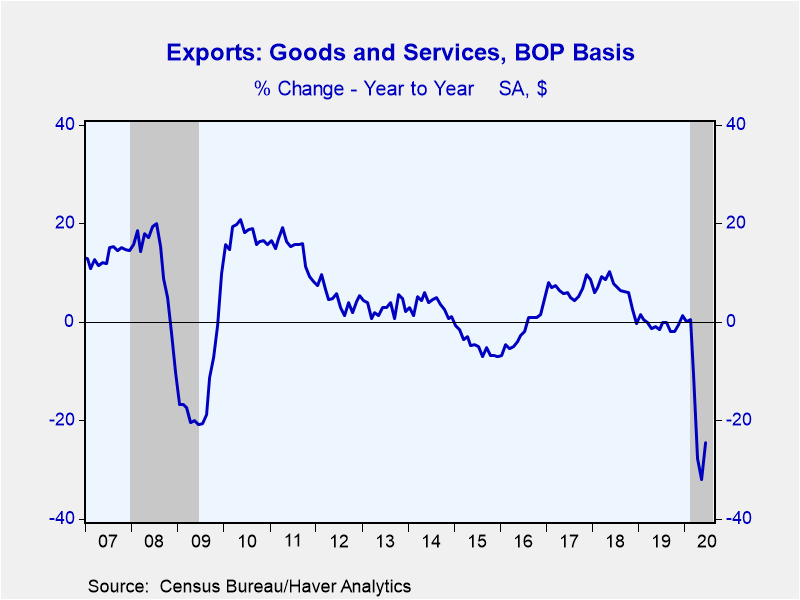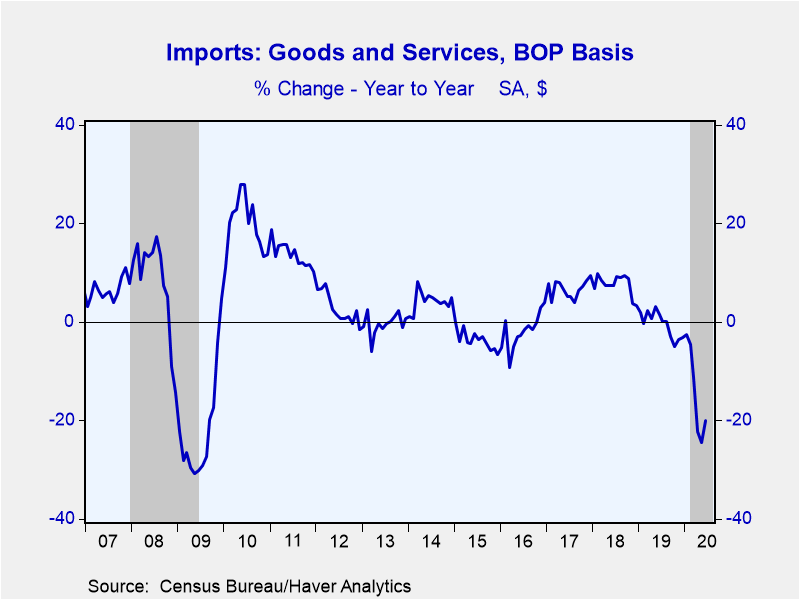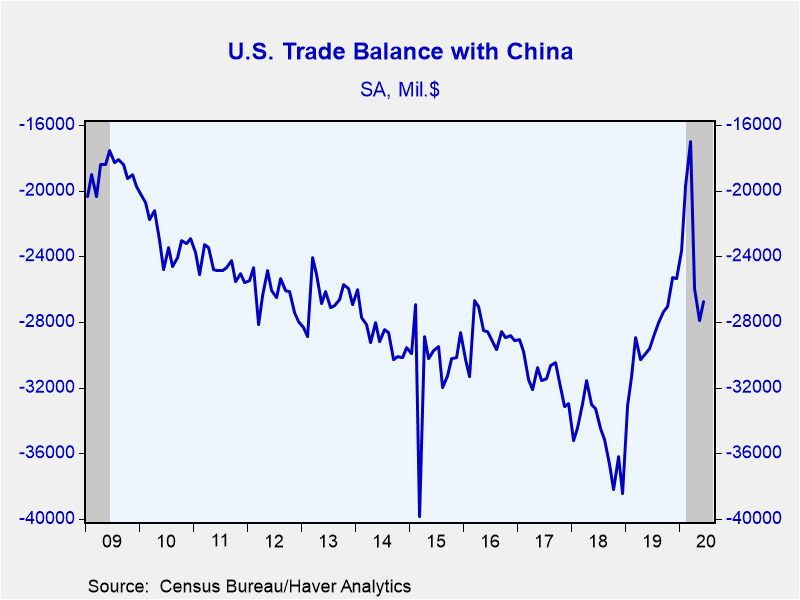 Global| Aug 05 2020
Global| Aug 05 2020U.S. Trade Deficit Narrows in June as Exports Jump 2X Imports; Trade Still Well Below Pre-COVID Levels
Summary
• Trade Deficit declines to $50.7 billion in June. • Exports rebound 9.4%; Imports rise 4.7%. • Exports remain 25.3% below February level; imports down 15.2%. The U.S. trade deficit in goods and services narrowed to $50.7 billion in [...]
• Trade Deficit declines to $50.7 billion in June.
• Exports rebound 9.4%; Imports rise 4.7%.
• Exports remain 25.3% below February level; imports down 15.2%.
The U.S. trade deficit in goods and services narrowed to $50.7 billion in June from an upwardly-revised $54.8 billion in May (was $54.6 billion). The Action Economics Forecast Survey anticipated $50.2 billion. Exports jumped 9.4% (-24.4% year-over-year), while imports increased 4.7% (-19.9% y/y). Even with these monthly gains exports remain 25.3% below February levels while imports are down 15.2% (February 2020 was not the peak in both exports and imports, those occurred in 2018). Trade was a small bright spot in last week's Q2 GDP report, adding 0.68 percentage points to GDP growth. Today's data suggests a slight downward revision to that figure.
The nominal deficit in goods trade narrowed to to $71.0 billion in June from $75.4 billion. The advanced trade data reported last week had a $70.6 billion goods deficit. Exports of goods jumped 14.3% (-23.7% y/y) as automotive exports soared 144.3% (-38.4% y/y). Imports of goods rose 5.1% (-16.9% y/y) also driven by a 107.8% gain in auto imports (-42.2% y/y). Petroleum imports gained 16.9% (-57.4% y/y) predominantly the result of rising oil prices (petroleum import volumes were up just 0.4% in June; -14.2% y/y). Non-petroleum imports grew 4.7% (-13.5% y/y). The real (inflation-adjusted) goods trade balance narrowed to $81.0 billion (chain-weighted 2012$) in June from $86.2 billion in May.
The surplus on trade in services edged up to $21.5 billion from slightly downwardly revised $21.4 billion (was $21.5 billion). The value of services exports grew 1.0% (-24.9% y/y) led by a 13.9% gain in transport services (-54.9%). Imports of services grew 1.4% (-32.4% y/y) also led by transport (+8.9% month-on-month; -54.3% y/y). Services exports are down 24.6% since February, while imports have fallen by 29.6% (the peaks in services trade occurred in 2019).
The politically-sensitive goods trade deficit with China narrowed to 26.7 billion in June from $27.9 billion. Both exports and imports to China fell 6.3% and 4.7% respectively (+0.1% and -7.3% y/y). The trade deficit with the European Union ticked widened to $13.1 billion while the imbalance with Japan narrowed to -1.8 billion.
The international trade data, including relevant data on oil prices, can be found in Haver's USECON database. Detailed figures on international trade are available in the USINT database. The expectations figures are from the Action Economics Forecast Survey, which is carried in AS1REPNA.
| Foreign Trade in Goods & Services (Current $) | Jun | May | Apr | Jun Y/Y | 2019 | 2018 | 2017 |
|---|---|---|---|---|---|---|---|
| U.S. Trade Deficit ($ bil.) | 50.70 | 54.80 | 49.76 | 51.75 | 576.86 | 579.94 | 513.79 |
| Exports of Goods & Services (% Chg) | 9.4 | -4.3 | -20.5 | -24.4 | -0.4 | 6.4 | 6.7 |
| Imports of Goods & Services (% Chg) | 4.7 | -0.7 | -13.6 | -19.9 | -0.5 | 7.5 | 6.7 |
| Petroleum (% Chg) | 16.9 | -2.0 | -48.8 | -57.4 | -14.0 | 20.8 | 27.2 |
| Nonpetroleum Goods (% Chg) | 4.7 | -0.6 | -11.3 | -13.5 | -0.4 | 7.4 | 5.5 |
Gerald D. Cohen
AuthorMore in Author Profile »Gerald Cohen provides strategic vision and leadership of the translational economic research and policy initiatives at the Kenan Institute of Private Enterprise.
He has worked in both the public and private sectors focusing on the intersection between financial markets and economic fundamentals. He was a Senior Economist at Haver Analytics from January 2019 to February 2021. During the Obama Administration Gerald was Deputy Assistant Secretary for Macroeconomic Analysis at the U.S. Department of Treasury where he helped formulate and evaluate the impact of policy proposals on the U.S. economy. Prior to Treasury, he co-managed a global macro fund at Ziff Brothers Investments.
Gerald holds a bachelor’s of science from the Massachusetts Institute of Technology and a Ph.D. in Economics from Harvard University and is a contributing author to 30-Second Money as well as a co-author of Political Cycles and the Macroeconomy.
More Economy in Brief
 Global| Feb 05 2026
Global| Feb 05 2026Charts of the Week: Balanced Policy, Resilient Data and AI Narratives
by:Andrew Cates









